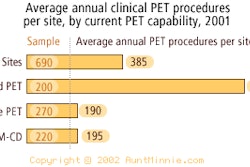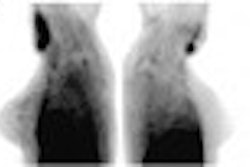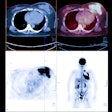The cardiac radiopharmaceutical Cardiolite has shown promise in detecting early-stage coronary artery disease in diabetes patients who don’t have symptoms of the disease, according to clinical results presented at this week’s American Society of Nuclear Cardiology meeting in Baltimore. Such patients are frequently at high risk for CAD but often don’t show symptoms of early-stage disease, according to Cardiolite’s manufacturer, Bristol Myers Squibb Medical Imaging of North Billerica, MA.
The multicenter study, entitled Detection of Ischemia in Asymptomatic Diabetics (DIAD), was led by researchers from Yale University in New Haven, CT. The prospective study involves over 1,000 patients with type II diabetes aged 50 to 75 with no known coronary artery disease.
At the ASNC meeting, the Yale group presented preliminary results from exams of 522 patients over two years. Of this group, 26% had an abnormal Cardiolite test, suggesting asymptomatic CAD. Of these patients, 83% (114 patients) were found to have abnormal blood flow, while 17% (23 patients) were found to have other abnormal findings, such as depressed left ventricular ejection fraction. None of the patients had CAD symptoms.
Bristol Myers Squibb believes the study could support expanded applications for Cardiolite, such as screening asymptomatic diabetes patients for coronary artery disease. Heart disease is the leading cause of death for 16 million Americans with type II diabetes, and their risk is believed to be two to four times that of the general population, according to the company.
By AuntMinnie.com staff writersOctober 3, 2002
Related Reading
Bristol-Myers Squibb appoints imaging chief, July 31, 2002
Bristol-Myers-Squibb, Amersham Health share patent rights, November 15, 2001
Bristol-Myers Squibb completes DuPont purchase, October 4, 2001
Copyright © 2002 AuntMinnie.com




















